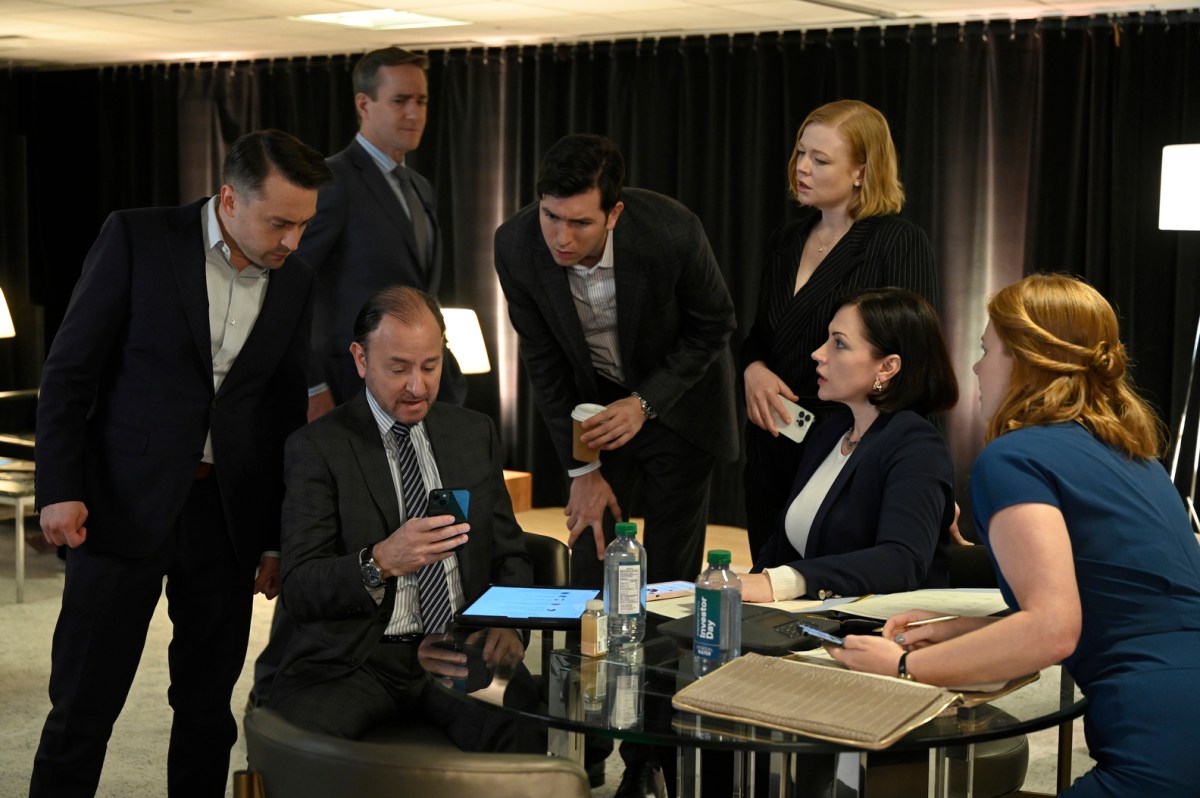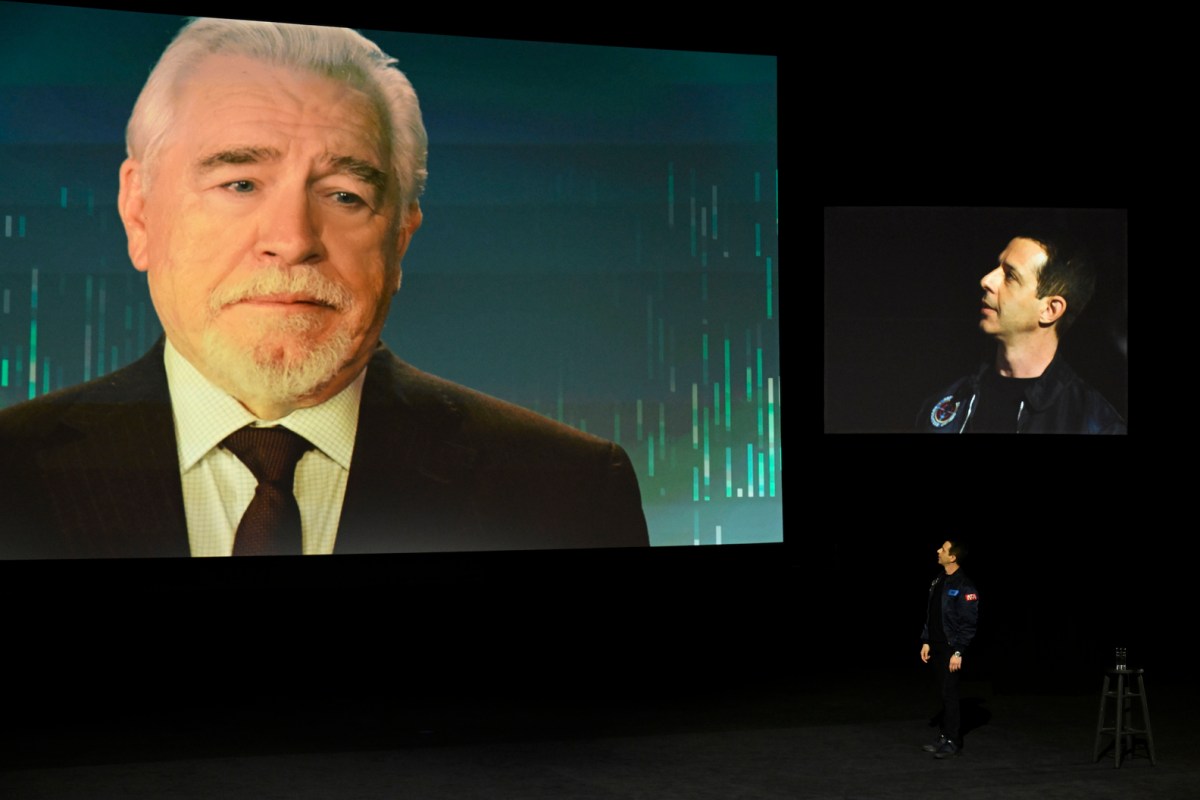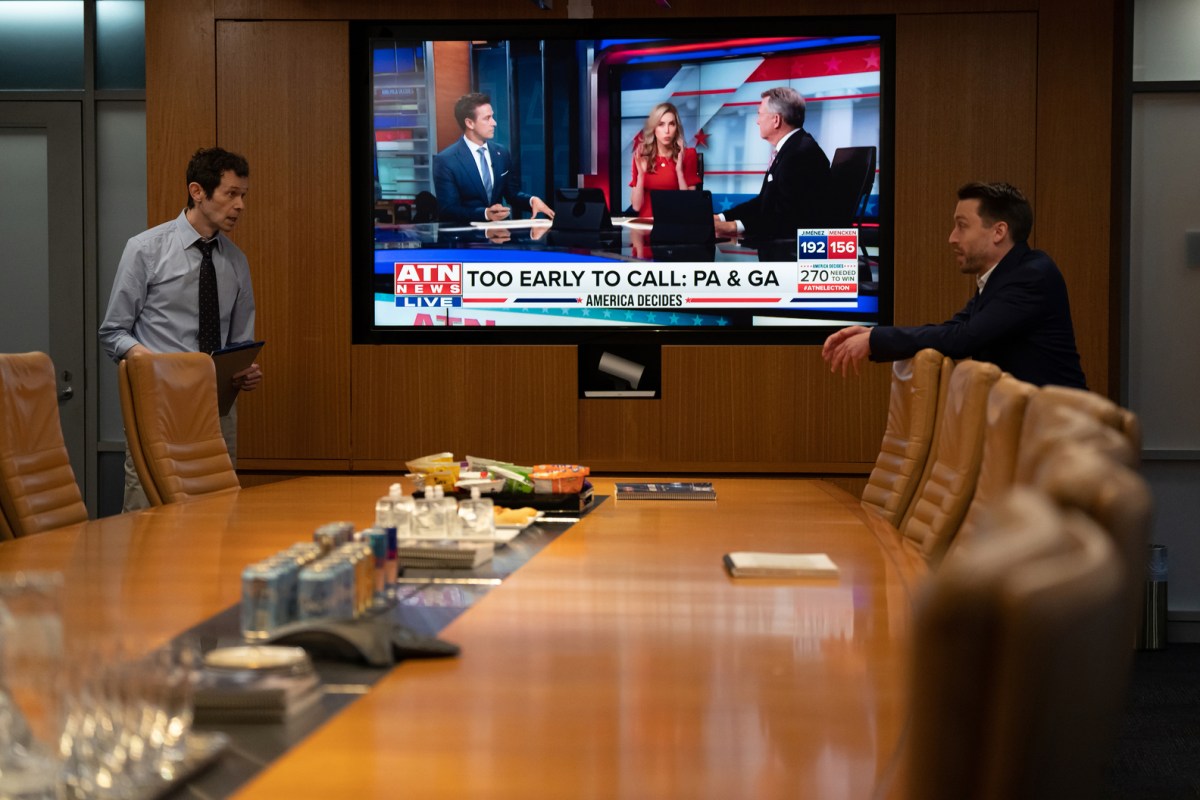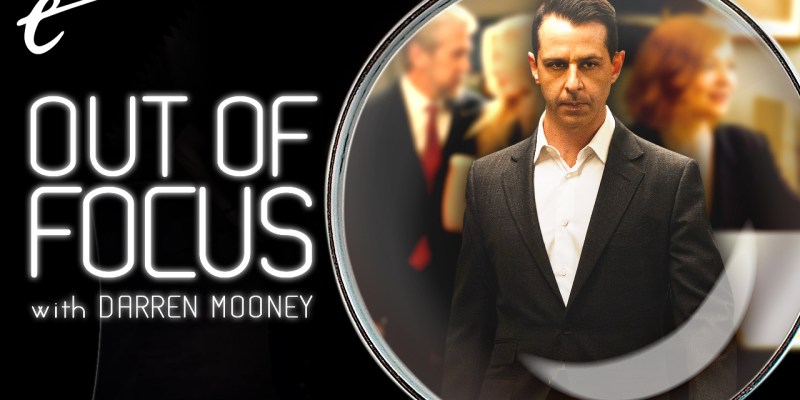This article contains spoilers for the most recent episode of Succession season 4 on HBO in its discussion of meaningless.
For the characters on Succession, nothing means anything. When that’s the case, everything means nothing.
This is perhaps most obvious in the show’s approach to language. The characters speak in a very distinctive way, often tripping over themselves and mixing metaphors, trying to sound smart while exposing their own ignorance. In the world of Succession, words are not a method of communication, but a tool of obfuscation. As Kendall Roy (Jeremy Strong) puts it in the show’s second episode, “Words are just, what? Nothing. Complicated air flow.”
The characters understand this logic. When Tom Wambsgan (Matthew Macfadyen) is called to testify in front of Congress in the second season, Hugo Baker (Fisher Stevens) urges him to speak as much as possible without saying anything. “Every minute you’re speaking, you’re stealing from them and their horseshit,” Hugo advises him. “Eat, eat, eat those dangerous fucking minutes.” This advice leads to Greg Hirsch (Nicholas Braun) spouting nonsense like, “If it is to be said, so it be. So it is.”
Throughout the show, characters use their words to avoid imparting any sense of meaning, often while trying to derive meaning from nonsense in turn. At a shareholder meeting, Vice-Chairman Frank Vernon (Peter Friedman) is forced to vamp on stage for hours as a delaying tactic while the company tries to derive meaning from the incoherent ramblings of CEO Logan Roy (Brian Cox), who has been driven “piss-mad” by a urinary tract infection.

A photo from the production of episode 407 of “Succession”. Photo: David M. Russell/HBO ©2022 HBO. All Rights Reserved.
In the episode “Safe Room,” Logan’s eldest son Connor (Alan Ruck) tries to eulogize a family friend who was also sex offender, but without saying anything that could be weaponized against him. This leads to a series of meaningless observations. “All of us will die someday,” Connor tells the assembled mourners. “In this case, it is Lester who has done so. Lester was alive for 78 years, but no more. Now he is dead. Lester’s wife is Maria. They were married for 15 years. Now she is sad.”
The Roys say what they want, without ascribing any value to it. This is one of the tensions of Tom’s marriage to Logan’s only daughter, Shiv (Sarah Snook). During a kinky roleplay, Shiv tells Tom that she doesn’t love him and that she is better than him. The following morning, she laughs it off. He replies, “Sometimes I think, ‘Should I maybe listen to the things you say directly in my face when we’re at our most intimate?’” Later, when she tells him she’s pregnant, he replies, “Is that even true?”
At the end of the second season, assembled on Logan’s private yacht to choose which among them will be the “blood sacrifice,” Kendall is careful to preface his argument for throwing Tom under the bus by preemptively disavowing his own words. “Look, I’m saying this, but I don’t believe it,” he states. “I’m just… I’m saying it, because this is the time we’re all saying things.” It is almost Orwellian in its double-speak.
In a broader sense, Succession is a show about a post-ideological world, a world that exists past any idea of meaning or any ordering principle. This is a show about declining empires, both Logan’s “empire of shit” and the western world in general. Visiting England at the end of the first season, Logan laments that the once-great nation “just lies here, you know, living off its capital, sucking in immigrants to turn it and stop it getting bed sores.”

A photo from the production of episode 406 of “Succession”. Photo: David M. Russell/HBO ©2022 HBO. All Rights Reserved.
Succession suggests that America is in a similar decline. Logan opines to Swedish billionaire Lukas Matsson (Alexander Skarsgård), “When I arrived, there were these gentle giants smelling of fucking gold and milk. They could do anything. Now look at them. Fat as fuck, scrawny on meth or yoga. They pissed it all away.” Leaving Connor’s bachelor party, Logan complains about the homeless on the streets of New York. “This city, the rats are as fat as skunks. They hardly care to run anymore.”
“Big picture: We’re at the end of the long American century,” explains Gerri Kellman (J. Smith-Cameron), the company’s chief legal counsel, at one point. “Our company is a declining empire inside a declining empire.” When the FBI raids the corporate headquarters with a warrant early in the third season, Frank notes “they’re at the gates,” evoking the sacking of Rome. The imagery would be evocative even if Logan’s youngest son weren’t named Roman (Kieran Culkin), short for “Romulus.”
It often seems like the only reason that Waystar Royco has survived is because the nation around it is similarly corrupted. It’s tempting to assume that capitalism is the show’s guiding light, and the show is very much about the inhuman horrors of late capitalism. However, one of those horrors is the reality that ultimately even the market itself is meaningless. It’s not an ideology; it’s a justification. The fourth season repeatedly emphasizes that numbers are no more trustworthy than words.
In “Living+,” Kendall inflates the company’s value by constantly revising projections. “The numbers aren’t just numbers,” complains the accountant (John Quilty) working on the presentation. “They’re numbers!” In the very next episode, “Tailgate Party,” Shiv discovers that the value of Matsson’s company, GoJo, has been distorted by subscriber numbers that are “a little bit bullshit.” These values are arbitrary and fungible, detached from any relationship to reality.

A photo from the production of episode 407 of “Succession”. Photo: David M. Russell/HBO ©2022 HBO. All Rights Reserved.
Then again, this is perhaps the ultimate capitalist ideology — that everything is malleable. In the third and fourth season premieres, Logan and Kendall separately misquote Mao Zedong’s instruction to “let a hundred flowers bloom.” The Cold War is over; the rigid boundaries between communism and capitalism have collapsed to such an extent that even one of the defining policies of Red China can be repurposed as meaningless corporate jargon.
Even people don’t get to define their own meaning. After Logan’s death, Kendall manipulates a recording of him to suit the company’s narrative. “We want him to say ‘double the earnings’ instead of ‘a significant boost,’” Greg instructs the editor (Micah Peoples). The editor replies, “I can talk to the sound editor, but you know, without those words, without him saying…” Ultimately, the footage is easily manipulated. Logan goes from being Kendall’s abusive father to his ventriloquist dummy.
Much has been written about how the modern world is “post-truth,” defined by “fake news” and “alternative facts” that have completely shattered any sense of shared reality. Many of the best shows of the prestige era, such as The Sopranos, thrived on ambiguity. Succession takes this idea further. In a world defined by these characters’ manipulation of words, numbers, and images to suit their ends, meaning may be impossible to determine at all.
After his father’s passing, Kendall is informed of a document that was found in Logan’s safe. In it, Logan named Kendall as his heir, which was the plan at the start of the show. However, at some point after their relationship became more contested and adversarial, Logan made some amendments to the document in pencil. As Kendall and others review the piece of paper, nobody is sure whether Logan was trying to underline Kendall’s name or trying to cross it out.

A photo from the production of episode 406 of “Succession”. Photo: David M. Russell/HBO ©2022 HBO. All Rights Reserved.
Kendall will never know with certainty what his father meant. Because of his inability to actually communicate with his father, he can never be sure how Logan ultimately felt about him. This is reflected in the show’s mythology, which is full of allusions to backstory that is never fully articulated. For example, with Logan dead it seems unlikely that the audience will ever truly know the details of what happened to his sister, Rose. There is no single fixed meaning. There is no unifying truth. This is the world as Logan has made it.
In the fourth season premiere, a few episodes before he dies fishing his phone out of a private jet toilet, Logan acknowledges the nihilism in conversation with his bodyguard — and maybe his only friend — Colin (Scott Nicholson). “You think there’s anything after all this?” he asks. He answers his own question, “I don’t think so.” Logan has built a world so broken that he cannot believe in anything beyond it. It’s fitting that his afterlife is just like a deepfake that Kendall uses to manipulate stock price.
This nihilism comes crashing into reality in the show’s antepenultimate episode, “America Decides.” In an obvious riff on the turbulent 2020 presidential election — albeit a version of that national nightmare where Rupert Murdoch didn’t intervene to force Fox News to call Arizona for the Democrats — the Roy family news network manipulates the electoral narrative in support of Republican candidate — and “integralist, nativist fuckhead” — Jeryd Mencken (Justin Kirk). It feeds conspiracy theories and calls Wisconsin before its ballots can be fully tallied.

A photo from the production of episode 408 of “Succession”. Photo: Macall Polay/HBO ©2022 HBO. All Rights Reserved.
Reflecting their post-ideology nihilism, the characters on Succession see themselves as beyond mere politics. Tom’s pre-election party is a social mixer for both “libtards” and “Nazis.” As the count begins, Roman jokes about it like a sporting event to Shiv: “My team’s playing your team. It’s only spicy because if my team wins, they’re gonna shoot your team.” When Shiv raises legitimate concerns about Mencken’s subversion of the democratic process, Roman dismisses them as “false flags.”
Mencken’s election has serious implications for America. Kendall’s adopted South Asian daughter Sophie (Swayam Bhatia) is harassed by emboldened Mencken supporters. However, none of the Roy family are motivated by principle. Roman and Kendall support Mencken because Mencken will stop Matsson from buying their father’s company. Shiv couches her opposition to Mencken in ideological terms, but she really just wants to force the sale through. Kendall ultimately does nothing to use his power to keep Sophie safe.
Swinging support to the narrative of Mencken’s victory, Roman rationalizes, “Nothing matters, Ken. Nothing fսcking matters. Dad’s dead, and the country’s just a big pussy waiting to get fսckеd.” He later presses the point, “It’s not like the fսcking ‘final’ final anyway.” Contemplating what they’ve done at the end of the episode, Roman states, “We just made a night of good TV. That’s what we’ve done. Nothing happens.” That may be true for Roman and his family.
That’s one of the many horrors of Succession. The choices of those who believe in nothing, who live lives insulated and isolated from meaning, ultimately get to decide everything.
